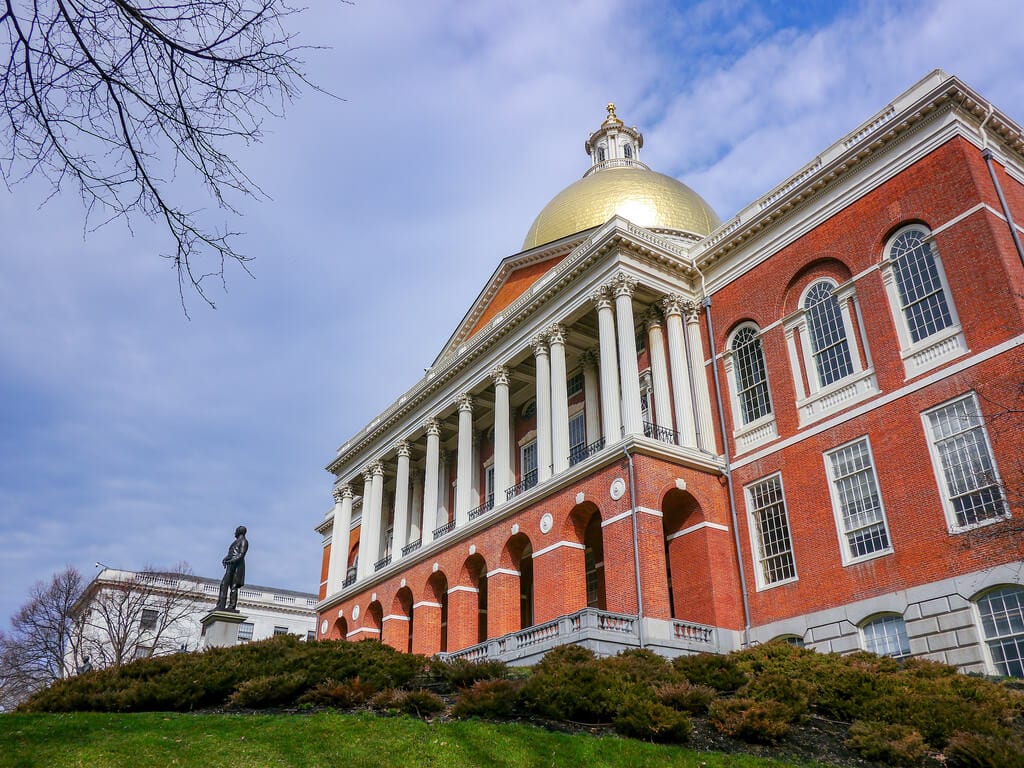With the Massachusetts’ two-year legislative session over, we summarize the climate action policies lawmakers decided to make into law.
Massachusetts’ two-year legislative session is over and lawmakers have decided on the climate policies that they want to become law. With negotiations over, legislators have chosen to send two bills to the Governor’s desk: one on clean energy, and the other addressing climate change adaptation.
Although making some gains, the bills didn’t do enough to move Massachusetts forward on climate action and clean energy. Massachusetts will fall behind states like Rhode Island in our share of renewably sourced electricity, New York in energy storage procurements, and Iowa in creating solar jobs. Popular provisions like modernizing our appliance efficiency standards, establishing intermediate emission reductions goals, and putting a price on carbon are all missing from the final text of the bills.
Advocates are not the only ones voicing frustration. Senate climate leader, Senator Marc Pacheco was quoted by State House News saying that we must immediately begin negotiating a new bill for the coming 2019-2020 session. While in the House, lifelong climate champion Representative Frank Smizik voted against the legislation, the only House member to do so.
Although the legislative session is effectively over, the Governor still has ten days to sign (or veto) these bills. If the Governor vetoes either (which is highly unlikely) lawmakers will not be able to override them, as they’ve waited to long and the session ends today (Tuesday 7/31) at midnight.
Bill #1: the Compromise Clean Energy Bill
On Monday (7/30) House and Senate negotiators released their compromise clean energy bill (H.4857- An Act to advance clean energy). Earlier this year the Senate passed an ambitious, and comprehensive, clean energy bill that it hoped would form the backbone of any clean energy laws passed this session. Meanwhile, the House decided to take a much more modest approach, approving just a handful of stand-alone clean energy bills and citing its desire to focus on other topics.
This final compromise version more closely resembles the House’s proposals, representing a significant compromise from the Senate’s comprehensive bill. Reactions have been mixed. The Boston Globe and leadership in both chambers heralded the bill as strong, saying they didn’t expect any movement on clean energy this session. Meanwhile, advocates and clean energy organizations have criticised the bill, saying it take us nowhere near where we need to be to address climate change and boost clean energy jobs.
Below is a summary of the key sections of this bill.
Renewable Portfolio Standard (RPS)
- Raises the RPS annual increase to 2% from the current 1%
- Under this regime, Massachusetts would achieve a total RPS of 36% by 2030, and a 56% by 2050
- Even with this increase, Massachusetts is set to fall behind the 2030 RPS mandates of California, New York, Oregon, Rhode Island, and many others
- This 2% increase starts in 2020, but declines back to 1% in 2030
Energy Storage
- Boosts state energy storage target from 200 MW to 1,000 MW by 2025
- Authorizes the executive branch to “consider a variety of policies” including procurements to achieve this target
- Massachusetts targets are below those in other states. New York has set a target of 1,500 MW by 2025, while California currently has 1,900 MW of storage deployed and is planning to procure an additional 2,000 MW by 2025
Offshore Wind
- Expands the state’s power to procure offshore wind by another 1,600 MW, bringing the total to 3,200 MW
- Massachusetts has so far procured only 800 MW in offshore wind
- New Jersey is the only state with more ambitious plans, having committed to develop 3,500 MW in offshore wind
Clean Peak Standard
- Would establish a legal basis for a ‘clean peak standard’ that creates credits to incentivize utilities to use cleaner energy sources during times of the year where power demand is highest
- Allows energy from biomass and waste burning to qualify for clean peak, raising significant environmental concerns
Energy efficiency and grid resiliency
- Updates existing law to modestly expand energy efficiency offerings within the MassSave program. Specifically targets buildings and homes
- Requires electricity utilities to publish an annual resiliency report that highlights peak demand periods and vulnerabilities in their distribution system
Solar
- Only allows demand charges on solar customers if justified in reducing peak load
- Utilities would also be required to regularly alert customers of any new charges
- Effectively requires a re-evaluation of the Eversource rate case
Gas Leaks
- Gives the administration the power to require gas companies to report any unaccounted gas, usually caused by gas leaks
- Also gives the administration the ability to grant waivers for the “development of innovative projects” to reduce gas leaks
The bill does not include a number of proposals pushed by climate and clean energy advocates, including:
- A state-wide price on carbon
- An increase in the cap for net metering
- Strengthening of the state’s appliance efficiency standards
- Investment in electric vehicle (EV) use
- A boost in the annual RPS increase to 3% a year
- 2030 and 2040 emission targets
- Restoring the retail rate for community solar and low-income solar customers
- Divestment of state pensions from fossil fuel investments
Bill #2: Environmental Bond Bill
First filed in March by Governor Baker, the final version of the environmental bond bill agreed upon by the legislature (H.4835) comprises 130 sections on 130 pages, appropriating $3.2 billion in debt spending. Although ostensibly a bill to invest in climate adaptation, only about $200 million goes towards hazard mitigation and climate change adaptation, with the majority of spending is directed towards recreation and conservation.
The largest line items are:
- $992 million for projects on the interstate and non-interstate federal highway system
- $420 million for DER reservations, forests, parks, campgrounds, swimming and wading pools, ball fields, playgrounds, and other recreational facilities
- $225 million for natural resource conservation, open space preservation, watershed remediation, coastal resource protection, etc.
- $160 million for DCR parkways, internal state park roads, recreational trails, etc.
- $150 million for investment in water and air quality protection
- $105 million for state-owned dams for which emergency action or statewide hazard mitigation is required
- $100 million for implementation of the integrated state hazard mitigation and climate change adaptation plan. This would further fund the state’s Municipal Vulnerability Preparedness (MVP) Program
The bill also includes a number of outside sections, not directly pertaining to increased debt spending. These include provisions that:
- Establish agricultural composting programs
- Modify tax valuation of agricultural land
- Create the Global Warming Solutions Trust Fund to fund implementation of the state’s clean energy and climate laws
- Require marking of barrels, boxes or containers of lobsters or lobster meat
- Create the Mohawk Trail Woodlands Partnership Fund
- Changes training requirements of municipal animal inspectors
- And much, much more
This final version retains almost all the earmarks from both the House and Senate bills and increases the overall amount of the appropriations from the Governor’s original $1.4 billion. In the outside sections, the conference committee also dropped more controversial provisions enacted by the Senate, including a plastic bag ban. It also dropped provisions relating to the establishment of an adaptation implementation advisory committee, and a requirement for regulatory consistency between the bill’s language and previous executive orders.









